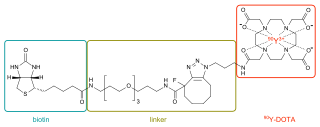
90Y-DOTA-biotin consists of a radioactive substance (yttrium-90) complexed by a chelating agent (DOTA), which in turn is attached to the vitamin biotin via a chemical linker. It is used experimentally in pretargeted radioimmunotherapy. Animal studies have been conducted as well as clinical studies in humans.

Monoclonal antibody therapy is a form of immunotherapy that uses monoclonal antibodies (mAbs) to bind monospecifically to certain cells or proteins. The objective is that this treatment will stimulate the patient's immune system to attack those cells. Alternatively, in radioimmunotherapy a radioactive dose localizes a target cell line, delivering lethal chemical doses. Antibodies are used to bind to molecules involved in T-cell regulation to remove inhibitory pathways that block T-cell responses. This is known as immune checkpoint therapy.
Bavituximab (PGN401) is a human-mouse chimeric monoclonal antibody against phosphatidylserine, which is a component of cell membranes that is exposed when a cell is transformed into solid tumor cancer cell or dies, and when cells are infected with hepatitis C. The process of cell death is highly controlled and so there usually no immune response to phosphatidylserine but when bavituximab binds to it, the conjugate appears to stimulate an immune response in humans.
Pemtumomab is a mouse monoclonal antibody used to treat cancer. The substance has affinity to various types of cancer, like ovarian cancer and peritoneal cancer, via the polymorphic epithelial mucin and delivers the radioisotope Yttrium-90 into the tumour. As of 2009, it is undergoing Phase III clinical trials.

Yttrium (90Y) tacatuzumab tetraxetan is a humanized monoclonal antibody intended for the treatment of cancer. The antibody itself, tacatuzumab, is conjugated with tetraxetan, a chelator for yttrium-90, a radioisotope which destroys the tumour cells.
Indium (111In) capromab pendetide is used to image the extent of prostate cancer. Capromab is a mouse monoclonal antibody which recognizes a protein found on both prostate cancer cells and normal prostate tissue. It is linked to pendetide, a derivative of DTPA. Pendetide acts as a chelating agent for the radionuclide indium-111. Following an intravenous injection of Prostascint, imaging is performed using single-photon emission computed tomography (SPECT).
Milatuzumab is an anti-CD74 humanized monoclonal antibody for the treatment of multiple myeloma non-Hodgkin's lymphoma and chronic lymphocytic leukemia.

Monomethyl auristatin E (MMAE) is a synthetic antineoplastic agent. Because of its toxicity, it cannot be used as a drug itself; instead, it is linked to a monoclonal antibody (MAB) which directs it to the cancer cells. In International Nonproprietary Names for MMAE-MAB-conjugates, the name vedotin refers to MMAE plus its linking structure to the antibody. It is a potent antimitotic drug derived from peptides occurring in marine shell-less mollusc Dolabella auricularia called dolastatins which show potent activity in preclinical studies, both in vitro and in vivo, against a range of lymphomas, leukemia and solid tumors. These drugs show potency of up to 200 times that of vinblastine, another antimitotic drug used for Hodgkin lymphoma as well as other types of cancer.
Glembatumumab vedotin is an antibody-drug conjugate (ADC) that targets cancer cells expressing transmembrane glycoprotein NMB (GPNMB).

Trastuzumab emtansine, sold under the brand name Kadcyla, is an antibody-drug conjugate consisting of the humanized monoclonal antibody trastuzumab (Herceptin) covalently linked to the cytotoxic agent DM1. Trastuzumab alone stops growth of cancer cells by binding to the HER2 receptor, whereas trastuzumab emtansine undergoes receptor-mediated internalization into cells, is catabolized in lysosomes where DM1-containing catabolites are released and subsequently bind tubulin to cause mitotic arrest and cell death. Trastuzumab binding to HER2 prevents homodimerization or heterodimerization (HER2/HER3) of the receptor, ultimately inhibiting the activation of MAPK and PI3K/AKT cellular signalling pathways. Because the monoclonal antibody targets HER2, and HER2 is only over-expressed in cancer cells, the conjugate delivers the cytotoxic agent DM1 specifically to tumor cells. The conjugate is abbreviated T-DM1.
Amatuximab is a chimeric monoclonal antibody designed for the treatment of cancer. It was developed by Morphotek, Inc.
Ganitumab is a human monoclonal antibody against type 1 insulin-like growth factor receptor (IGF1R), designed for the treatment of cancers.
Vorsetuzumab mafodotin (SGN-75) is an antibody-drug conjugate (ADC) directed to the protein CD70 designed for the treatment of cancer. It is a humanized monoclonal antibody, vorsetuzumab, conjugated with noncleavable monomethyl auristatin F (MMAF), a cytotoxic agent.
Vantictumab is a human IgG2 monoclonal antibody designed for the treatment of cancer.
Seagen Inc. is an American biotechnology company focused on developing and commercializing innovative, empowered monoclonal antibody-based therapies for the treatment of cancer. The company, headquartered in Bothell, Washington, is the industry leader in antibody-drug conjugates or ADCs, a technology designed to harness the targeting ability of monoclonal antibodies to deliver cell-killing agents directly to cancer cells. Antibody-drug conjugates are intended to spare non-targeted cells and thus reduce many of the toxic effects of traditional chemotherapy, while potentially enhancing antitumor activity.
Sofituzumab vedotin is a monoclonal antibody designed for the treatment of ovarian cancer.
Indusatumab vedotin (MLN-0264) is an antibody-drug conjugate that is under development for the treatment of pancreatic cancer and other gastrointestinal cancers. It consists of a monoclonal antibody (indusatumab) that targets the enzyme guanylate cyclase 2C which is present in some cancers, linked to an average of three to four molecules of the chemotherapeutic agent monomethyl auristatin E (MMAE).
Depatuxizumab mafodotin is an antibody-drug conjugate designed for the treatment of cancer. It is composed of an EGFR IGg1 monoclonal antibody (depatuxizumab) conjugated to the tubulin inhibitor monomethyl auristatin F via a stable maleimidocaproyl link.
Rovalpituzumab tesirine (Rova-T) is an experimental antibody-drug conjugate targeting the protein DLL3 on tumor cells. It was originally developed by Stemcentrx and was purchased by AbbVie. It was tested for use in small-cell lung cancer, but development was terminated after unsuccessful phase III trial.

Lutetium (177Lu) vipivotide tetraxetan, sold under the brand name Pluvicto, is a radiopharmaceutical medication used for the treatment of prostate-specific membrane antigen (PSMA)-positive metastatic castration-resistant prostate cancer (mCRPC). Lutetium (177Lu) vipivotide tetraxetan is a targeted radioligand therapy.





